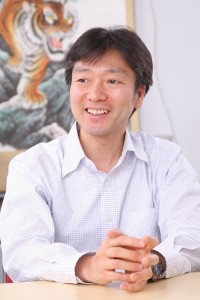We are delighted to welcome Professor Motomu Kanai and Dr Helen Sneddon as new Editorial Board members for Green Chemistry.
Professor Motomu Kanai was born in 1967 in Tokyo, Japan, and received his bachelor degree from The University of Tokyo (UTokyo) in 1989 under the direction of late Professor Kenji Koga. In the middle of his PhD course in UTokyo (in 1992), he obtained an assistant professor position in Osaka University under the direction of Professor Kiyoshi Tomioka. He obtained his PhD from Osaka University in 1995. Then, he moved to University of Wisconsin, USA, for postdoctoral studies with Professor Laura L. Kiessling. In 1997 he returned to Japan and joined Professor Masakatsu Shibasaki’s group in UTokyo as an assistant professor. After doing lecturer (2000~2003) and associate professor (2003~2010), he is currently a professor in UTokyo (since 2010). He is also the PI of ERATO Kanai Life Science Project (since 2011). He has received The Pharmaceutical Society of Japan Award for Young Scientists (2001), Thieme Journals Award (2003), Merck-Banyu Lectureship Award (MBLA: 2005), and Asian Core Program Lectureship Award (2008 and 2010, from Thailand, Malaysia, and China). His research interests entail design and synthesis of functional molecules, such as catalysts and drug lead molecules.
Dr Helen Sneddon read Natural Sciences at Christ’s College, Cambridge University, and stayed at Cambridge to complete her PhD in organic chemistry, on b-keto-dithianes and their application to the synthesis of natural products, with Professor Steven V. Ley. After postdoctoral work on the asymmetric catalytic chemistry of Palladium (II) with Professor Larry Overman at the University of California, Irvine, she joined GlaxoSmithKline at Stevenage, UK in 2007 as a medicinal chemist, working on respiratory medicines. In late 2011 she founded GSK’s Green Chemistry Performance Unit, a team she continues to lead, looking at improving the environmental sustainability of research and development, and the routes arising from it. She was made Honorary Professor of Sustainable Chemistry at the University of Nottingham in August 2014. She has particular interests in solvent and reagent selection and the development of more efficient transformations.
Take a look at some of their recent contributions to Royal Society of Chemistry journals:
Reaction mediated artificial cell termination: control of vesicle viability using Rh(I)-catalyzed hydrogenation
Hirokazu Komatsu, Yuki Daimon, Kohsaku Kawakami, Motomu Kanai, Jonathan P. Hill and Katsuhiko Ariga
Phys. Chem. Chem. Phys., 2014, DOI: 10.1039/C4CP02255F, Paper
Catalytic enantioselective synthesis of 2-(2-hydroxyethyl)indole scaffolds via consecutive intramolecular amido-cupration of allenes and asymmetric addition of carbonyl compounds
Prasanna Kumara Chikkade, Yohei Shimizu and Motomu Kanai
Chem. Sci., 2014, DOI: 10.1039/C3SC52803K, Edge Article
Sustainable chromatography (an oxymoron?)
Emily A. Peterson, Barry Dillon, Izzat Raheem, Paul Richardson, Daniel Richter, Rachel Schmidt and Helen F. Sneddon
Green Chem., 2014, DOI: 10.1039/C4GC00615A, Perspective
Development of GSK’s reagent guides – embedding sustainability into reagent selection
Joseph P. Adams, Catherine M. Alder, Ian Andrews, Ann M. Bullion, Matthew Campbell-Crawford, Michael G. Darcy, John D. Hayler, Richard K. Henderson, Catriona A. Oare, Israil Pendrak, Anikó M. Redman, Leanna E. Shuster, Helen F. Sneddon and Matthew D. Walker
Green Chem., 2013, DOI: 10.1039/C3GC40225H, Paper












